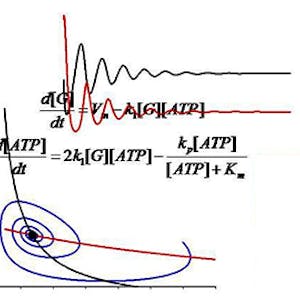Dynamical Modeling Methods for Systems Biology
An introduction to dynamical modeling techniques used in contemporary Systems Biology research.We take a case-based approach to teach contemporary mathematical modeling
techniques. The course is appropriate for advanced undergraduates and beginning graduate students. Lectures provide biological background and describe the development of both classical mathematical models and more recent representations of biological processes. The course will be useful for students who plan to use experimental techniques as their approach in the laboratory and employ computational modeling as a tool to draw deeper understanding of experiments. The course should also be valuable as an introductory overview for students planning to conduct original research in modeling biological systems.
This course focuses on dynamical modeling techniques used in Systems Biology research. These techniques are based on biological mechanisms, and simulations with these models generate predictions that can subsequently be tested experimentally. These testable predictions frequently provide novel insight into biological processes. The approaches taught here can be grouped into the following categories: 1) ordinary differential equation-based models, 2) partial differential equation-based models, and 3) stochastic models.
None
Syllabus
Syllabus - What you will learn from this course
Week 1
Introduction | Computing with MATLAB
Week 2
Introduction to Dynamical Systems
Week 3
Bistability in Biochemical Signaling Models
Week 4
Computational Modeling of the Cell Cycle
Week 5
Modeling Electrical Signaling
Week 6
Modeling with Partial Differential Equations
Week 7
Stochastic Modeling
FAQ
When will I have access to the lectures and assignments?
Access to lectures and assignments depends on your type of enrollment. If you take a course in audit mode, you will be able to see most course materials for free. To access graded assignments and to earn a Certificate, you will need to purchase the Certificate experience, during or after your audit. If you don't see the audit option:
The course may not offer an audit option. You can try a Free Trial instead, or apply for Financial Aid.
The course may offer 'Full Course, No Certificate' instead. This option lets you see all course materials, submit required assessments, and get a final grade. This also means that you will not be able to purchase a Certificate experience.
What will I get if I subscribe to this Specialization?
When you enroll in the course, you get access to all of the courses in the Specialization, and you earn a certificate when you complete the work. Your electronic Certificate will be added to your Accomplishments page - from there, you can print your Certificate or add it to your LinkedIn profile. If you only want to read and view the course content, you can audit the course for free.
Is financial aid available?
Yes. In select learning programs, you can apply for financial aid or a scholarship if you can’t afford the enrollment fee. If fin aid or scholarship is available for your learning program selection, you’ll find a link to apply on the description page.
Reviews
Interesting subject, I liked the practical approach. The tests are not easy but I liked the homework style approach. It forces you to understand the subject better than the regular quizzes.
A+. Great course, easy to follow, and amazing instructor. Thank you Eric!
Probably the best course in this overall very nice specialization
The first week on MATLAB was a great refresher since I hadn't used MATLAB in a few years
